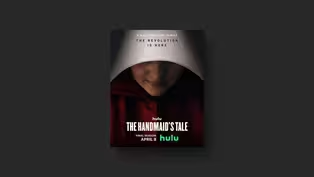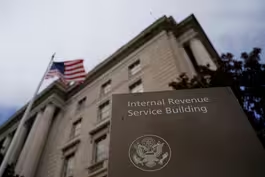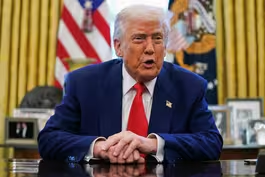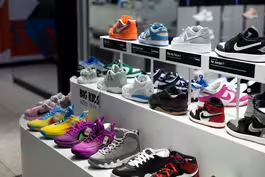
Work of public servants highlighted in 'Who is Government?'
Clip: 4/9/2025 | 10m 16sVideo has Closed Captions
Michael Lewis highlights crucial work of public servants in 'Who is Government?'
The role of the federal government has been at the center of a national debate over the last few months. But who really is our government and what is it made of? Judy Woodruff set out for answers in her ongoing series, America at a Crossroads.
Problems playing video? | Closed Captioning Feedback
Problems playing video? | Closed Captioning Feedback
Major corporate funding for the PBS News Hour is provided by BDO, BNSF, Consumer Cellular, American Cruise Lines, and Raymond James. Funding for the PBS NewsHour Weekend is provided by...

Work of public servants highlighted in 'Who is Government?'
Clip: 4/9/2025 | 10m 16sVideo has Closed Captions
The role of the federal government has been at the center of a national debate over the last few months. But who really is our government and what is it made of? Judy Woodruff set out for answers in her ongoing series, America at a Crossroads.
Problems playing video? | Closed Captioning Feedback
How to Watch PBS News Hour
PBS News Hour is available to stream on pbs.org and the free PBS App, available on iPhone, Apple TV, Android TV, Android smartphones, Amazon Fire TV, Amazon Fire Tablet, Roku, Samsung Smart TV, and Vizio.
Providing Support for PBS.org
Learn Moreabout PBS online sponsorshipAMNA NAWAZ: The role of the federal government has been squarely at the center of the national debate the last few months.
But who are the people who comprise that system of government?
Judy Woodruff set out for answers in her ongoing series America at a Crossroads.
JUDY WOODRUFF: A hundred and sixty feet below the surface, my team and I got a crash course on the history of coal mining and what was once one of the leading causes of death in mines.
CHRISTOPHER MARK, Federal Mine Safety Specialist: And this square is coal that has not been mined.
That's what's keeping the mountain over our heads.
JUDY WOODRUFF: Christopher Mark spent his life's work trying to prevent roof collapses in coal mines.
He works for the U.S. Department of Labor's Mine Safety and Health Administration, but was speaking to us as a private citizen.
CHRISTOPHER MARK: When I started looking at the data and saying, let's just not look kind of in general what the coal industry thinks is important.
Let's look at what's really killing people.
JUDY WOODRUFF: Mark began his career underground in 1976 working as a coal miner himself in West Virginia after graduating from high school in Princeton, New Jersey.
He later went on to get a Ph.D. in mining engineering and now lives near the Tour-Ed Mine & Museum we visited together just north of Pittsburgh.
CHRISTOPHER MARK: Part of the problem was that the engineers who had been attacking this problem had been looking at it with an engineering mind-set.
JUDY WOODRUFF: But Mark took that mind-set and combined it with statistics to create new software that's credited with saving an untold number of lives.
Mark and his work are one of the stories in a new book edited by bestselling author Michael Lewis, "Who Is Government?
: The Untold Story of Public Service."
It's based on a Washington Post series written by Lewis and six other authors.
MICHAEL LEWIS, Author, "Who Is Government?
: The Untold Story of Public Service": It's sort of like all the mess that the private sector can't solve, it is really hard to solve, ends up being government responsibility.
JUDY WOODRUFF: We met up with Lewis at Politics and Prose in Washington, where he explained how he picked Mark's name off last year's list of nominees for the annual Sammies Awards, Samuel J. Heyman Service to America Medals, created by the nonprofit Partnership for Public Service.
MICHAEL LEWIS: There was one character who was kind of described in this list.
It said, Chris Mark, Department of Labor, solve the problem of coal mine roofs falling in on the heads of coal mines, which killed 50,000 coal miners in the last century, and then it said, a former coal miner.
And I thought, there's got to be a story there.
It's like, who comes out of a coal mine and solves a big technical problem like that?
He'd save thousands of lives.
No one knew who he was.
He didn't care if anybody knew who he was.
JUDY WOODRUFF: A turning point in Chris Mark's career and in mine safety was the August 2007 collapse at the Crandall Canyon Mine in Utah that killed nine miners and rescuers.
It was blamed on inadequate mine design that led to the failure of roof-supporting pillars.
Mark was asked by Congress to come up with a way to reduce similar accidents.
Since then, the number of roof fall deaths has declined dramatically to zero deaths in 2016.
Mark says the federal government, rather than private industry, was needed to make the changes.
CHRISTOPHER MARK: If somebody did come up with a better approach to pillar design, their own company would have wanted to keep that in-house because it would have saved them money and their competitors wouldn't have had it.
But because the federal government developed it and it was specifically a safety measure, then we're trying to diffuse it as widely and as rapidly as possible.
And nobody else has that incentive.
JUDY WOODRUFF: What is your estimate of how many mine collapses have been avoided and lives have been saved as a result of what you have done?
CHRISTOPHER MARK: That's really very difficult to do.
I mean, a big part of the role that the government plays in Americans' lives is to avert disasters.
And there's really no way of counting the disasters that you have averted and the number of lives that you have saved.
JUDY WOODRUFF: When Lewis was pulling the book together, he gave no guidance to the six contributing writers, other than to find interesting stories.
The result?
Eight essays, an ode to public service, that Lewis says were more typical than not.
MICHAEL LEWIS: I could write a hundred stories like this in the federal government.
They're just kind of there waiting, because it is this great and neglected institution filled with really interesting people.
DONALD TRUMP, President of the United States: So help me God.
JUDY WOODRUFF: Since taking office, President Trump and special government employee Elon Musk have effectively shuttered entire agencies and slashed the federal work force.
DONALD TRUMP: Many of them don't work at all.
Many of them never showed up to work.
We want to cut the people that aren't working or doing -- not doing a good job.
We're keeping the best people.
JUDY WOODRUFF: Their goal?
To reduce federal spending by at least $1 trillion.
ELON MUSK, Department of Government Efficiency: At the end of the day, America is going to be in much better shape.
America will be solvent.
The critical programs that people depend upon will work and it's going to be a fantastic future.
FRANKLIN DELANO ROOSEVELT, Former President of the United States: In the working out of a great national program that seeks the primary good of the greater number... JUDY WOODRUFF: The modern federal government began to take form nearly a century ago as a reaction to the Great Depression.
President Franklin D. Roosevelt's New Deal, combined with the impact of World War II, significantly broadened the government's influence over nearly every area of life.
But by the 1960s, public support for government and the people who work in it began to wane.
And the role of government has become increasingly divisive.
According to a recent Pew Research Center poll, just 38 percent of Republicans and Republican-leaning independents expressed a great deal or fair amount of confidence in federal career employees, compared with 72 percent of Democrats and Democratic leaners.
Lewis said these starkly different views of government is a result of how the civil service is portrayed by elected officials.
MICHAEL LEWIS: Ronald Reagan famously campaigned on the idea that the most dangerous words in the English language is, I'm from the federal government and I'm here to help you.
There's a kind of -- there's an incentive system in politics.
And the incentive, if you're an elected official in Washington, is an incentive to take credit for anything that works and to blame career people for anything that doesn't work.
And the population has been more or less conditioned to hear negative things about the federal work force.
JUDY WOODRUFF: Lewis points out that the number of civil service employees has remained constant over the past 50 years, at 2.3 million, even as the country has grown.
He acknowledges there's room to cut waste and inefficiency, but questions how the administration is doing it.
MICHAEL LEWIS: The way they're going about it is not designed to save very much money.
I mean, if you look at the federal budget, I think 86 percent of it is either entitlements like Social Security and Medicare, interest payments on the debt, or defense, and they're not addressing any of those.
All their cuts are taking place in a sliver of the pie that's just 14 percent.
There's only so much they can do there.
And this is the first time I have seen anybody go in and vilify the work force in advance of getting rid of people, so, like treating them as the enemy and with a conscious strategy of traumatizing the work force.
JUDY WOODRUFF: With the careers of so many other civil service employees uncertain, Lewis told us none of the others profiled in the book were willing to speak with us on camera.
Two of the workers he profiled, he added, resigned before they could be fired.
Have you experienced a climate like what we're seeing right now, where there's fear of speaking out?
CHRISTOPHER MARK: No.
No, this really is something new.
I mean, I have worked for the federal government now for almost 40 years and I have seen administrations come and go, but I have never had the experience where we would get e-mails that imply that somehow we're the problem, that we're doing bad things.
In my experience, people work for the federal government primarily the same way anybody works anywhere else.
I mean, you're doing it to earn a living, but federal employees are proud of what they do.
They're proud of the contributions that we make to society.
MICHAEL LEWIS: The government's not just this incidental piece of democracy.
So what has happened and what is accelerating is, if you disable the government, like, make it even harder for the good people who are in it to do their jobs, so they do them less well, through no fault of their own, you just have not given them the tools to do their job, you reinforce the idea that government can't do anything.
You create this vicious cycle, like, of cynicism and make it -- make this -- the country essentially ungovernable.
So that's where you're -- so that's where it's headed, chaos.
I don't think we're going to go there.
I think we're going to bounce.
I really do.
I don't think - - I think we're a more constructive country.
We're too successful a country, basically.
We'd be throwing too much away.
So I think we're going to bounce, but if you want to destroy the society, you destroy the government.
JUDY WOODRUFF: For the "PBS News Hour," I'm Judy Woodruff in Washington.
'Handmaid's Tale' stars on the evolution of their characters
Video has Closed Captions
Clip: 4/9/2025 | 6m 54s | 'The Handmaid's Tale' stars on the evolution of their characters as series reaches its end (6m 54s)
How the global trade wars could affect personal finances
Video has Closed Captions
Clip: 4/9/2025 | 4m 45s | How the global trade wars could affect personal finances of Americans (4m 45s)
Top IRS official quits over plans to share personal data
Video has Closed Captions
Clip: 4/9/2025 | 7m 11s | Top IRS official quits over plans to share personal data with immigration authorities (7m 11s)
Trump pauses many of his tariffs but raises rate on China
Video has Closed Captions
Clip: 4/9/2025 | 13m 7s | Trump pauses many of his tariffs but raises rate on China (13m 7s)
What tariffs mean for the U.S. footwear industry
Video has Closed Captions
Clip: 4/9/2025 | 4m 2s | What tariffs and trade war threats mean for the U.S. footwear industry (4m 2s)
Providing Support for PBS.org
Learn Moreabout PBS online sponsorship
- News and Public Affairs

FRONTLINE is investigative journalism that questions, explains and changes our world.

- News and Public Affairs

Amanpour and Company features conversations with leaders and decision makers.












Support for PBS provided by:
Major corporate funding for the PBS News Hour is provided by BDO, BNSF, Consumer Cellular, American Cruise Lines, and Raymond James. Funding for the PBS NewsHour Weekend is provided by...




